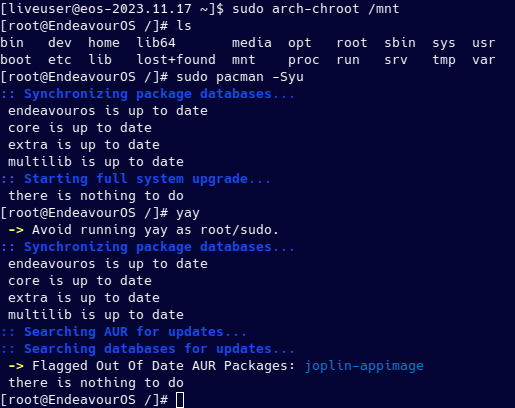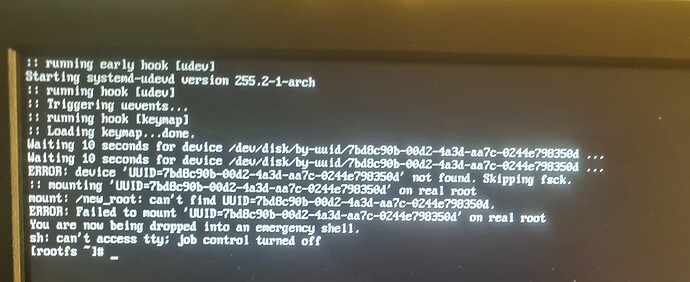Hi everyone,
I’m new to EndeavourOS (and Arch to be honest). I did my installation via the GUI. All worked perfectly until today after I upgraded my linux kernel to the latest for arch (the last update I did on my system was 5 days ago). I’m using mkinitcpio to build images. When I rebooted my system, ramdisk couldn’t find my device :
So, I tried several solutions (https://forum.endeavouros.com/t/cant-boot-after-upgrading-endeavouros/41767, https://forum.endeavouros.com/t/system-no-longer-boot-after-update/36270, https://forum.endeavouros.com/t/boot-failing-device-not-found/35743 and https://discovery.endeavouros.com/system-rescue/arch-chroot/2022/12/). Unfortunately, all these methods didn’t work.
My system is (almost) up to date:

Here’s my disk partitions :
Before open encrypt partition and mount point :
after :
After a sudo arch-chroot /mnt, here’s my lsblk
NAME TYPE FSTYPE SIZE UUID
loop0 loop 2.2G
...
Windows crap and non related data disk
...
nvme0n1 disk 3.6T
├─nvme0n1p1 part 9.8G
├─nvme0n1p2 part 512M
└─nvme0n1p3 part 3.6T
└─luks-b8455122-3e78-4e8d-9aed-b528b43cf73d crypt 3.6T
My /etc/fstab :
UUID=2bd3cd71-19f0-49ee-be75-366e0efc0ff2 /boot ext4 noatime 0 2
UUID=8BD5-4635 /boot/efi vfat fmask=0137,dmask=0027 0 2
/dev/mapper/luks-b8455122-3e78-4e8d-9aed-b528b43cf73d / ext4 noatime 0 1
tmpfs /tmp tmpfs defaults,noatime,mode=1777 0 0
/dev/disk/by-uuid/68DC0C9BDC0C6622 /mnt/68DC0C9BDC0C6622 auto nosuid,nodev,nofail,x-gvfs-show 0 0
/dev/disk/by-uuid/94D2CE6ED2CE5460 /mnt/94D2CE6ED2CE5460 auto nosuid,nodev,nofail,x-gvfs-show 0 0
And finally, my /boot/grub/grub.conf :
#
# DO NOT EDIT THIS FILE
#
# It is automatically generated by grub-mkconfig using templates
# from /etc/grub.d and settings from /etc/default/grub
#
### BEGIN /etc/grub.d/00_header ###
insmod part_gpt
insmod part_msdos
if [ -s $prefix/grubenv ]; then
load_env
fi
if [ "${next_entry}" ] ; then
set default="${next_entry}"
set next_entry=
save_env next_entry
set boot_once=true
else
set default="0"
fi
if [ x"${feature_menuentry_id}" = xy ]; then
menuentry_id_option="--id"
else
menuentry_id_option=""
fi
export menuentry_id_option
if [ "${prev_saved_entry}" ]; then
set saved_entry="${prev_saved_entry}"
save_env saved_entry
set prev_saved_entry=
save_env prev_saved_entry
set boot_once=true
fi
function savedefault {
if [ -z "${boot_once}" ]; then
saved_entry="${chosen}"
save_env saved_entry
fi
}
function load_video {
if [ x$feature_all_video_module = xy ]; then
insmod all_video
else
insmod efi_gop
insmod efi_uga
insmod ieee1275_fb
insmod vbe
insmod vga
insmod video_bochs
insmod video_cirrus
fi
}
if loadfont unicode ; then
set gfxmode=auto
load_video
insmod gfxterm
set locale_dir=$prefix/locale
set lang=en_US
insmod gettext
fi
terminal_input console
terminal_output gfxterm
if [ x$feature_timeout_style = xy ] ; then
set timeout_style=menu
set timeout=5
# Fallback normal timeout code in case the timeout_style feature is
# unavailable.
else
set timeout=5
fi
### END /etc/grub.d/00_header ###
### BEGIN /etc/grub.d/10_linux ###
menuentry 'EndeavourOS Linux' --class endeavouros --class gnu-linux --class gnu --class os $menuentry_id_option 'gnulinux-simple-7bd8c90b-00d2-4a3d-aa7c-0244e798350d' {
load_video
set gfxpayload=keep
insmod gzio
insmod part_gpt
insmod ext2
search --no-floppy --fs-uuid --set=root 2bd3cd71-19f0-49ee-be75-366e0efc0ff2
echo 'Loading Linux linux ...'
linux /vmlinuz-linux root=UUID=7bd8c90b-00d2-4a3d-aa7c-0244e798350d rw nowatchdog nvme_load=YES rd.luks.uuid=b8455122-3e78-4e8d-9aed-b528b43cf73d loglevel=3
echo 'Loading initial ramdisk ...'
initrd /intel-ucode.img /initramfs-linux.img
}
submenu 'Advanced options for EndeavourOS Linux' $menuentry_id_option 'gnulinux-advanced-7bd8c90b-00d2-4a3d-aa7c-0244e798350d' {
menuentry 'EndeavourOS Linux, with Linux linux' --class endeavouros --class gnu-linux --class gnu --class os $menuentry_id_option 'gnulinux-linux-advanced-7bd8c90b-00d2-4a3d-aa7c-0244e798350d' {
load_video
set gfxpayload=keep
insmod gzio
insmod part_gpt
insmod ext2
search --no-floppy --fs-uuid --set=root 2bd3cd71-19f0-49ee-be75-366e0efc0ff2
echo 'Loading Linux linux ...'
linux /vmlinuz-linux root=UUID=7bd8c90b-00d2-4a3d-aa7c-0244e798350d rw nowatchdog nvme_load=YES rd.luks.uuid=b8455122-3e78-4e8d-9aed-b528b43cf73d loglevel=3
echo 'Loading initial ramdisk ...'
initrd /intel-ucode.img /initramfs-linux.img
}
menuentry 'EndeavourOS Linux, with Linux linux (fallback initramfs)' --class endeavouros --class gnu-linux --class gnu --class os $menuentry_id_option 'gnulinux-linux-fallback-7bd8c90b-00d2-4a3d-aa7c-0244e798350d' {
load_video
set gfxpayload=keep
insmod gzio
insmod part_gpt
insmod ext2
search --no-floppy --fs-uuid --set=root 2bd3cd71-19f0-49ee-be75-366e0efc0ff2
echo 'Loading Linux linux ...'
linux /vmlinuz-linux root=UUID=7bd8c90b-00d2-4a3d-aa7c-0244e798350d rw nowatchdog nvme_load=YES rd.luks.uuid=b8455122-3e78-4e8d-9aed-b528b43cf73d loglevel=3
echo 'Loading initial ramdisk ...'
initrd /intel-ucode.img /initramfs-linux-fallback.img
}
}
### END /etc/grub.d/10_linux ###
### BEGIN /etc/grub.d/15_ostree ###
### END /etc/grub.d/15_ostree ###
### BEGIN /etc/grub.d/20_linux_xen ###
### END /etc/grub.d/20_linux_xen ###
### BEGIN /etc/grub.d/25_bli ###
if [ "$grub_platform" = "efi" ]; then
insmod bli
fi
### END /etc/grub.d/25_bli ###
### BEGIN /etc/grub.d/30_os-prober ###
### END /etc/grub.d/30_os-prober ###
### BEGIN /etc/grub.d/30_uefi-firmware ###
if [ "$grub_platform" = "efi" ]; then
fwsetup --is-supported
if [ "$?" = 0 ]; then
menuentry 'UEFI Firmware Settings' $menuentry_id_option 'uefi-firmware' {
fwsetup
}
fi
fi
### END /etc/grub.d/30_uefi-firmware ###
### BEGIN /etc/grub.d/40_custom ###
# This file provides an easy way to add custom menu entries. Simply type the
# menu entries you want to add after this comment. Be careful not to change
# the 'exec tail' line above.
### END /etc/grub.d/40_custom ###
### BEGIN /etc/grub.d/41_custom ###
if [ -f ${config_directory}/custom.cfg ]; then
source ${config_directory}/custom.cfg
elif [ -z "${config_directory}" -a -f $prefix/custom.cfg ]; then
source $prefix/custom.cfg
fi
### END /etc/grub.d/41_custom ###
### BEGIN /etc/grub.d/45_eos_windows ###
menuentry 'Windows Boot Manager (on /dev/sdb1)' --class windows --class os $menuentry_id_option 'osprober-efi-6673-58D3' {
insmod part_gpt
insmod fat
set root='hd1,gpt1'
if [ x$feature_platform_search_hint = xy ]; then
search --no-floppy --fs-uuid --set=root --hint-bios=hd1,gpt1 --hint-efi=hd1,gpt1 --hint-baremetal=ahci1,gpt1 6673-58D3
else
search --no-floppy --fs-uuid --set=root 6673-58D3
fi
chainloader /efi/Microsoft/Boot/bootmgfw.efi
}
### END /etc/grub.d/45_eos_windows ###
When I do sudo mkinitcpio -P, I get some warnings :
==> Building image from preset: /etc/mkinitcpio.d/linux.preset: 'default'
==> Using default configuration file: '/etc/mkinitcpio.conf'
-> -k /boot/vmlinuz-linux -g /boot/initramfs-linux.img --microcode /boot/intel-ucode.img
==> Starting build: '6.6.9-arch1-1'
-> Running build hook: [base]
-> Running build hook: [udev]
-> Running build hook: [autodetect]
-> Running build hook: [modconf]
-> Running build hook: [kms]
-> Running build hook: [keyboard]
==> WARNING: Possibly missing firmware for module: 'xhci_pci'
-> Running build hook: [keymap]
-> Running build hook: [consolefont]
==> WARNING: consolefont: no font found in configuration
-> Running build hook: [lvm2]
-> Running build hook: [block]
-> Running build hook: [filesystems]
-> Running build hook: [fsck]
==> Generating module dependencies
==> Creating zstd-compressed initcpio image: '/boot/initramfs-linux.img'
==> Image generation successful
==> Building image from preset: /etc/mkinitcpio.d/linux.preset: 'fallback'
==> Using default configuration file: '/etc/mkinitcpio.conf'
-> -k /boot/vmlinuz-linux -g /boot/initramfs-linux-fallback.img -S autodetect --microcode /boot/intel-ucode.img
==> Starting build: '6.6.9-arch1-1'
-> Running build hook: [base]
-> Running build hook: [udev]
-> Running build hook: [modconf]
-> Running build hook: [kms]
==> WARNING: Possibly missing firmware for module: 'ast'
-> Running build hook: [keyboard]
==> WARNING: Possibly missing firmware for module: 'xhci_pci'
-> Running build hook: [keymap]
-> Running build hook: [consolefont]
==> WARNING: consolefont: no font found in configuration
-> Running build hook: [lvm2]
-> Running build hook: [block]
==> WARNING: Possibly missing firmware for module: 'qed'
==> WARNING: Possibly missing firmware for module: 'qla2xxx'
==> WARNING: Possibly missing firmware for module: 'wd719x'
==> WARNING: Possibly missing firmware for module: 'qla1280'
==> WARNING: Possibly missing firmware for module: 'aic94xx'
==> WARNING: Possibly missing firmware for module: 'bfa'
-> Running build hook: [filesystems]
-> Running build hook: [fsck]
==> Generating module dependencies
==> Creating zstd-compressed initcpio image: '/boot/initramfs-linux-fallback.img'
==> Image generation successful
My /etc/mkinitcpio.conf :
# vim:set ft=sh
# MODULES
# The following modules are loaded before any boot hooks are
# run. Advanced users may wish to specify all system modules
# in this array. For instance:
# MODULES=(usbhid xhci_hcd)
MODULES=()
# BINARIES
# This setting includes any additional binaries a given user may
# wish into the CPIO image. This is run last, so it may be used to
# override the actual binaries included by a given hook
# BINARIES are dependency parsed, so you may safely ignore libraries
BINARIES=()
# FILES
# This setting is similar to BINARIES above, however, files are added
# as-is and are not parsed in any way. This is useful for config files.
FILES=()
# HOOKS
# This is the most important setting in this file. The HOOKS control the
# modules and scripts added to the image, and what happens at boot time.
# Order is important, and it is recommended that you do not change the
# order in which HOOKS are added. Run 'mkinitcpio -H <hook name>' for
# help on a given hook.
# 'base' is _required_ unless you know precisely what you are doing.
# 'udev' is _required_ in order to automatically load modules
# 'filesystems' is _required_ unless you specify your fs modules in MODULES
# Examples:
## This setup specifies all modules in the MODULES setting above.
## No RAID, lvm2, or encrypted root is needed.
# HOOKS=(base)
#
## This setup will autodetect all modules for your system and should
## work as a sane default
# HOOKS=(base udev autodetect modconf block filesystems fsck)
#
## This setup will generate a 'full' image which supports most systems.
## No autodetection is done.
# HOOKS=(base udev modconf block filesystems fsck)
#
## This setup assembles a mdadm array with an encrypted root file system.
## Note: See 'mkinitcpio -H mdadm_udev' for more information on RAID devices.
# HOOKS=(base udev modconf keyboard keymap consolefont block mdadm_udev encrypt filesystems fsck)
#
## This setup loads an lvm2 volume group.
# HOOKS=(base udev modconf block lvm2 filesystems fsck)
#
## NOTE: If you have /usr on a separate partition, you MUST include the
# usr and fsck hooks.
# HOOKS=(base udev autodetect modconf kms keyboard keymap consolefont numlock block filesystems fsck)
HOOKS=(base udev autodetect modconf kms keyboard keymap consolefont lvm2 block filesystems fsck)
# COMPRESSION
# Use this to compress the initramfs image. By default, zstd compression
# is used. Use 'cat' to create an uncompressed image.
#COMPRESSION="zstd"
#COMPRESSION="gzip"
#COMPRESSION="bzip2"
#COMPRESSION="lzma"
#COMPRESSION="xz"
#COMPRESSION="lzop"
#COMPRESSION="lz4"
# COMPRESSION_OPTIONS
# Additional options for the compressor
#COMPRESSION_OPTIONS=()
# MODULES_DECOMPRESS
# Decompress kernel modules during initramfs creation.
# Enable to speedup boot process, disable to save RAM
# during early userspace. Switch (yes/no).
#MODULES_DECOMPRESS="yes"
Have a nice day and Happy New Year!


